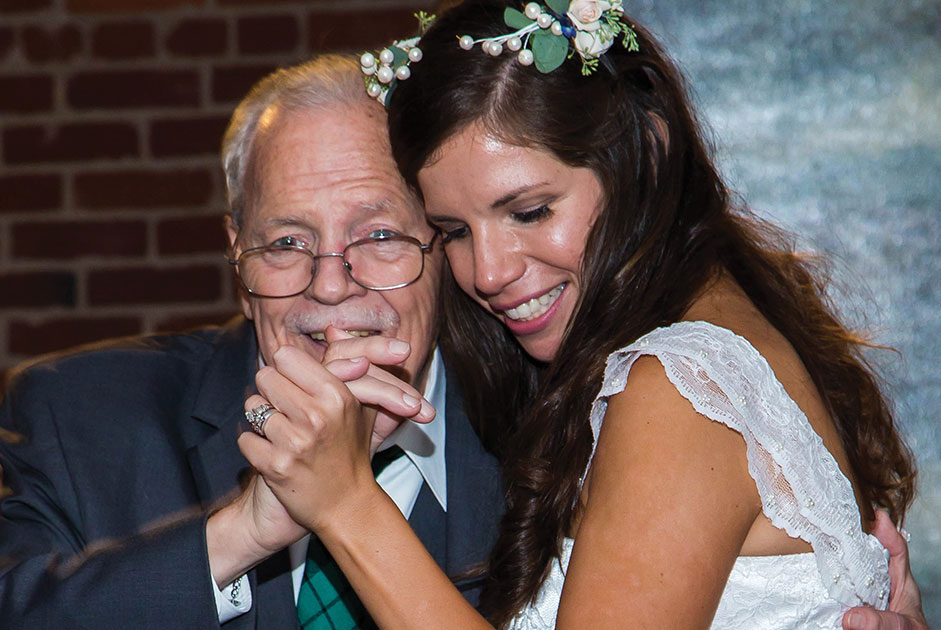BY ELISA WALLACE COPPEDE
My father, Daniel Reid Wallace, had a bigger than life personality. There wasn’t a stranger he wouldn’t enjoy a long chat with. At times, this could be embarrassing growing up, as we couldn’t seem to go anywhere in Winston-Salem, without our father saying “Howdy” to “Sheila,” our waitress at a local café, or “Jon,” our gas station attendant. Having been a teacher for almost 40 years, my father had a razor-sharp memory when it came to remembering names. His former students loved him for this. Often, they would stop by our table to say hello to the loud, southern teacher.
This was exactly why, when my father began forgetting people’s names, a quiet voice began to whisper in my head that something was not quite right. I tried to brush it off. The man was not a “spring chicken,” as he would say, and would often chuckle when he couldn’t remember his waitress’s name. The same waitress that had been serving him for over a decade. Later, he would shrug when he couldn’t figure out how to add a simple five-dollar tip to our bill. “Princess, when you’re my age, your memory just isn’t what it used to be,” he would quietly whisper, quick to change the subject. “Now, let’s go grab an ice cream cone, my love!” he would say with a peck on the cheek, as he whisked us out to his truck.
We lost this man, my bigger than life father, almost three years ago. That quiet nagging voice wouldn’t be overlooked anymore. With great horror, I watched as Alzheimer’s disease took the very man who helped give me life. The former US Navy officer, Peace Corp volunteer, and teacher, who remembered hundreds of names, didn’t know his own daughter’s that last day. For this, I will always secretly hate myself for not listening to that little voice and trying to get him help sooner.
While my father ultimately died of Alzheimer’s disease, it first started off with him being diagnosed as having “dementia.” What exactly does this mean? According to the Alzheimer’s disease organization, “dementia is not a single disease; it’s an overall term — like heart disease — that covers a wide range of specific medical conditions, including Alzheimer’s disease.” Often these changes trigger a decline in thinking skills, also known as cognitive abilities, severe enough to impair daily life and independent function. What is most upsetting is that the decline can also affect behavior, feelings, and relationships.
What exactly are the troubling first signs of dementia and Alzheimer’s disease? Read on for some of the tell-tale signs that someone you may love and care about is going through the same thing my father was.
Early Detection Sign #1: Problems with basic short-term memory. Short term memory is the information that a person is currently thinking about or is aware of. It is also often called primary or active memory. If someone you know and love has trouble remembering something that just happened, like a trip to the grocery store, phone call with family member, or what they ate that morning, you may want to investigate.
Early Detection Sign #2: Trouble keeping track of wallet or purse. While I am often misplacing my phone, I always know where my wallet—where all my IDs and credit cards are—is located. This is an item that most people with normal memory do not forget. If someone you know is having multiple issues with losing their wallet or purse, you may want to look a bit deeper.
Early Detection Sign #3: Trouble with paying bills. This was the one thing that truly made me begin to question what was really going on with my father. While my father was always great with numbers, I found it extremely odd when I heard him ask mother to pay bills or even add up a tip for a dinner out. This is absolutely a tell-tale sign that something with one’s memory may be happening.
Early Detection Sign #4: Remembering appointments. Considering that there are so many ways to remember one’s appointments, from hard copy calendars to digital calendars on our phones, when someone begins to forget these meetings, something with their memory may be up. My father was notoriously organized. He would cross off every day on his desk calendar, which would also feature when bills were due, birthdays were coming up, and of course, appointments. When I noticed that his calendar had gone blank, I began to hear that voice again.
Early Detection Sign #5: Trouble with traveling. Often those suffering from dementia and/or Alzheimer’s disease become fearful of getting lost. They may not want to drive, even to the closest venues. On the other hand, some like my father may not be fearful at all but begin to forget basic traffic rules. For my pops, when he began to have a few minor fender benders, we knew that we needed to stop him from driving. One of the toughest things that we had to do as a family was permanently take away his car keys. While this was rough for us, we knew he was simply not safe on the road.
I am telling my father’s story for the first time publicly because I hope it can help those who are harboring the same pain, those ignoring the same quiet voice. If there is one piece of advice I could give anyone right now, it is to NOT disregard that nagging feeling. Instead, amplify it. Use it to research and learn more about this disease. Use it to get that person you love the most, the best doctor as quickly as possible.


















